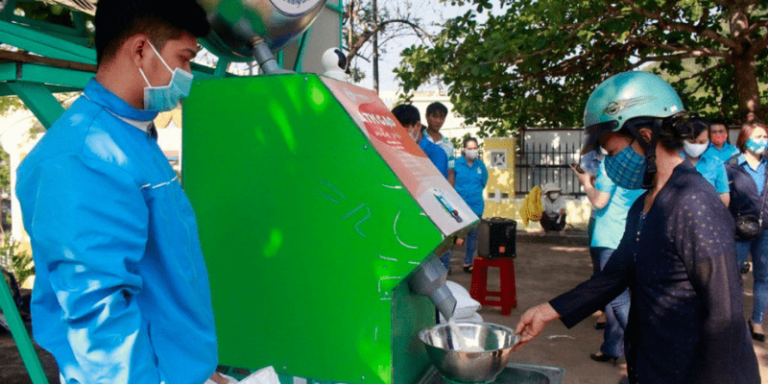The Spill: Food ATMs
Weekly news you can use.
By: GenZ Staff | April 22, 2020 | 863 Words

(Xinhua/ via Getty Images)
Vietnam Feeds People with Rice ATMs
The Coronavirus pandemic has shut down businesses, resulted in people losing their jobs, and has made it hard for families to make ends meet. Volunteer organizations have stepped up to help, and governments around the world have implemented plans such as President Donald Trump and Congress working to send stimulus checks to Americans. One country has a novel method to make sure its people have enough food. In Vietnam, citizens can now get free rice via ATM machines to help feed their families during the lockdown.
Although the country has one of the lowest incidents of the virus, with 265 cases reported and zero deaths, the country has been practicing strict social distancing. Businesses and other donors have set up machines, or ATMs, that will dispense rice for free in many cities within Vietnam.
 In the city of Hanoi, residents can fill bags of rice from a large water tank between 8 a.m. and 5 p.m. every day. Social distancing is in place as people need to stand six feet from each other as well as using hand sanitizer before they get their rice.
In the city of Hanoi, residents can fill bags of rice from a large water tank between 8 a.m. and 5 p.m. every day. Social distancing is in place as people need to stand six feet from each other as well as using hand sanitizer before they get their rice.
In Hue, a central city in Vietnam, residents can get up to 4.4 pounds (2 kilograms) of free rice from an ATM located at a college. Ho Chi Minh City has a rice dispenser that provides the food 24-hours a day, and in Da Nang, there are two ATMs scheduled to be set up sometime this week.
Students Sabotage Study Apps
The COVID-19 pandemic has changed our way of life over the last month, and one significant area has been education. Instead of attending physical classrooms and getting in-person teaching, schools and students have been forced to use other methods, such as online learning. However, some young people are questioning whether they should have to face the stress of schoolwork during isolation. What is the balance of work and play in students’ lives today, and what can be done to ensure pupils continue to progress with their learning without feeling overburdened? Some students in China and America resent the intrusion and have tried to sabotage education apps during the COVID-19 crisis.
Pupils in China started a campaign to spam an app called DingTalk, which is used for assigning homework and attending virtual classrooms. Thousands of young people gave the app a one-star rating, hoping that if the rating fell enough, the app would be removed. The effort had a huge impact, with the app falling from 4.9 stars to just 1.4. However, the app stayed in use as adults caught on to the trend.
While some of the reviews were legitimate claims against the program, many of the complaints were about the lockdown rather than the app. Some of the remarks included: “Feel the frustration of the ruined vacation,” “Bring our holidays back,” and “Imagine having to do homework while you’re possibly going to die from a disease.”
In America, students submitted bad reviews of the online service Google Classroom, hoping to have it removed from the app store. The campaign began with TikTok videos which told viewers to give low ratings to the app. The efforts dropped its rating to only 1.7 stars.
There were some legitimate complaints, but most of the bad reviews centered around not wanting to do schoolwork during a pandemic shutdown. Is this a genuine concern of students, or is it important to keep studying even when not at school?
World’s Longest Animal Discovered
Are there UFOs in the sea? Scientists on an exploration dive in the deep sea off Australia’s coast seem to think so, or rather it is how they describe their newest discovery. Among 30 new marine species, one of the largest discovered was a siphonophore which measured an astounding 150 feet.
The research vehicle took its occupants nearly 15,000 feet deep, but it wasn’t until they were on their way back up, at around 2,066 feet, that the extra-long siphonophore was seen. Nerida Wilson, a senior research scientist at the Western Australia Museum and the lead in the expedition, said, “The word soon spread and people came pouring into the control room to share the excitement. It was just amazing to see this huge organism spread out like a spiral UFO, hovering in the water column. We couldn’t believe what we were seeing.”
The siphonophore species are deep-sea predators. They are made up of many small clones that act together as one. They spread out in the water like one long string and hunt together as one animal. Much like jellyfish, the siphonophores dangle their stinging tentacles in the water to trap and feed on prey such as crustaceans and fish.
This newest discovery is thought to be the largest of the marine species, about twice as long as some blue whales.
The place of discovery was in the area referred to as the Gascoyne Coast bioregion, a protected site. “While it’s a protected area, we actually have no idea what lives there,” Wilson said. “We really wanted to reveal the incredible biodiversity that is there.”
“We were definitely looking for and expecting new species,” she added. “Those waters were just too unexplored to not yield such treasures.”

















